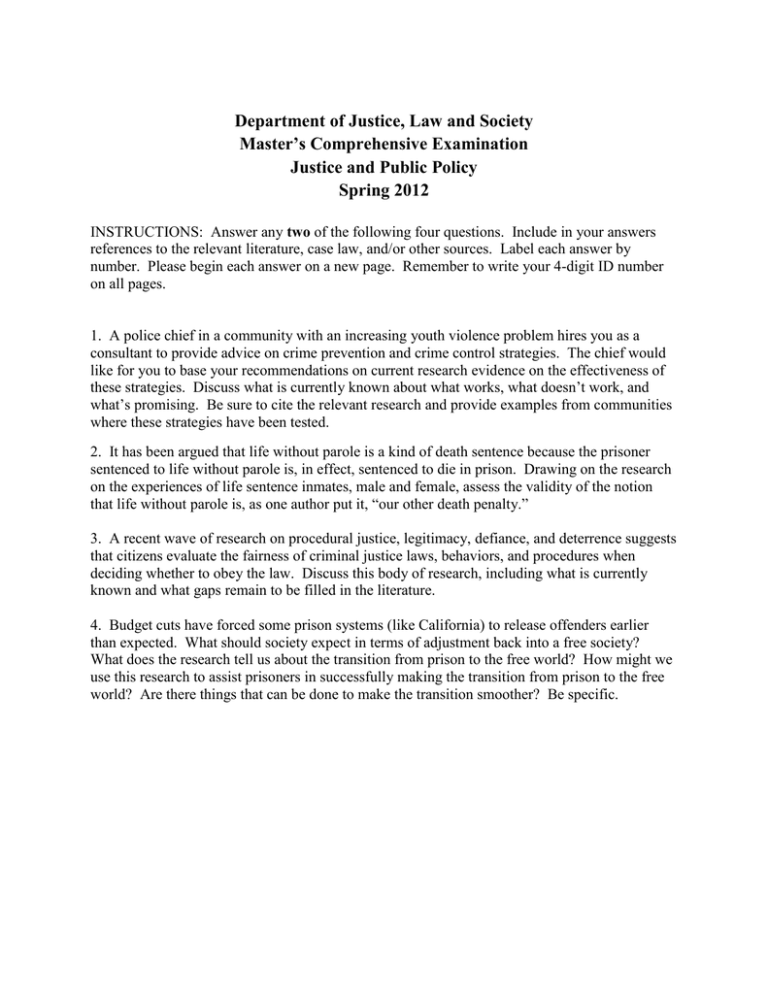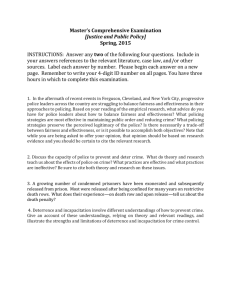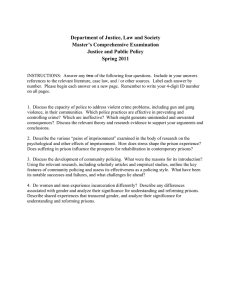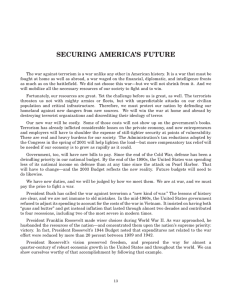Department of Justice, Law and Society Master’s Comprehensive Examination Spring 2012
advertisement

Department of Justice, Law and Society Master’s Comprehensive Examination Justice and Public Policy Spring 2012 INSTRUCTIONS: Answer any two of the following four questions. Include in your answers references to the relevant literature, case law, and/or other sources. Label each answer by number. Please begin each answer on a new page. Remember to write your 4-digit ID number on all pages. 1. A police chief in a community with an increasing youth violence problem hires you as a consultant to provide advice on crime prevention and crime control strategies. The chief would like for you to base your recommendations on current research evidence on the effectiveness of these strategies. Discuss what is currently known about what works, what doesn’t work, and what’s promising. Be sure to cite the relevant research and provide examples from communities where these strategies have been tested. 2. It has been argued that life without parole is a kind of death sentence because the prisoner sentenced to life without parole is, in effect, sentenced to die in prison. Drawing on the research on the experiences of life sentence inmates, male and female, assess the validity of the notion that life without parole is, as one author put it, “our other death penalty.” 3. A recent wave of research on procedural justice, legitimacy, defiance, and deterrence suggests that citizens evaluate the fairness of criminal justice laws, behaviors, and procedures when deciding whether to obey the law. Discuss this body of research, including what is currently known and what gaps remain to be filled in the literature. 4. Budget cuts have forced some prison systems (like California) to release offenders earlier than expected. What should society expect in terms of adjustment back into a free society? What does the research tell us about the transition from prison to the free world? How might we use this research to assist prisoners in successfully making the transition from prison to the free world? Are there things that can be done to make the transition smoother? Be specific. Department of Justice, Law and Society Master’s Comprehensive Examination Terrorism and Security Policy Spring 2012 INSTRUCTIONS: Answer any two of the following four questions. Include in your answers references to the relevant literature, case law, and/or other sources. Label each answer by number. Please begin each answer on a new page. Remember to write your 4-digit ID number on all pages. 1. In what ways is terrorism like war? In what ways is it different? How might military policies be relevant for intervening against terrorism? How might they be limited or even counterproductive? 2. What useful purposes are served by the public’s fear of terrorism? What problems does it pose? Can the public’s fear of terrorism be managed? Should it be? How? 3. Has the occurrence of terrorism in the United States been fundamentally different from terrorism in other places? In what way(s)? In what ways has it been like terrorism in other countries? How has the mix of home-grown and cross-national terrorist events differed generally from country to country? How do you explain the differences? the similarities? 4. What do authorities say are the most important lessons learned over the past several years about protecting the public against terrorism? Are they consistent with scholarly theories of how to cope with terrorism? Which of these arguments do you agree and disagree with? Why? Department of Justice, Law and Society Master’s Comprehensive Examination Law and Society Spring 2012 INSTRUCTIONS: Answer any two of the following four questions. Include in your answers references to the relevant literature, case law, and/or other sources. Label each answer by number. Please begin each answer on a new page. Remember to write your 4-digit ID number on all pages. 1. Social contract theorists suggest that government is legitimate where it has the consent of the governed. Compare the different senses which several such authors have given the concept of “consent.” How do these differences affect the outcome of each author’s theory? Can the requirement of consent ever be met? 2. What is the source and what are the limits of the obligation to obey the law? Consider the views of several leading theorists, and discuss how their views on the source of this obligation inform their views on its limits. 3. Various postmodernist legal theories suggest that the law should take account of our identities as formed through membership in different groups. This challenges the idea that the law ought to treat people as individuals responsible for their own actions. To what extent does American law explicitly or implicitly adopt this postmodernist ideal? Discuss specific cases or areas of law and show how they reflect, or fail to reflect, this approach. 4. Mainstream legal theories present law as a constraint on government, while some modern critics emphasize the use of law by the powerful as a way of maintaining current power relations. Which of these views most accurately reflects the role of law in the contemporary U.S.? Consider the views of theorists on each side of the issue. Department of Justice, Law and Society Master’s Comprehensive Examination Jurisprudence and Social Thought Spring 2012 INSTRUCTIONS: Answer any two of the following four questions. Include in your answers references to the relevant literature, case law, and/or other sources. Label each answer by number. Please begin each answer on a new page. Remember to write your 4-digit ID number on all pages. 1. The debt crises in Greece, Italy, and Portugal that are engulfing Europe is developing a storyline pitting the hard working northern Europeans against the lazy and profligate southern Europeans. The fact that the creditor nations are primarily Protestant while the debt ridden nations are either Catholic or Orthodox feeds into this narrative. What would Max Weber have to say about the current economic situation in Europe and its relation to the religious and cultural practices of the respective member states? 2. Former Secretary of State Henry Kissinger once famously derided the idea of the European Union as a state by asking, “who do I call when I want to call Europe?” Is the European Union a single legal system? In answering your question, consider such problems as the lack of clear legislative and executive power. Please refer to the views of Hart, Dworkin, Finnis, and Kennedy in answering this question. 3. Rousseau thought that the first person to assert private ownership of property was the greatest criminal of the world, while Locke thought that such property was a precondition of personal sovereignty. Explain why they take such different views to this question. In doing so, consider how Michael Walzer and Robert Nozick would respond to the arguments of Rousseau and Locke. 4. If any common, correct meaning of law is impossible, as postmodernist critics of law suggest, then the group with the greatest political power is also the group that gets to define what the law is. In other words, everything, including the meaning of law and morality, is simply the product of power. If this is true, explain why we should adopt any of the proposals put forth by critical legal theories. In doing so, be sure not to violate their belief that there is no objectively correct morality but rather just the view of those with the greatest power to exert.







